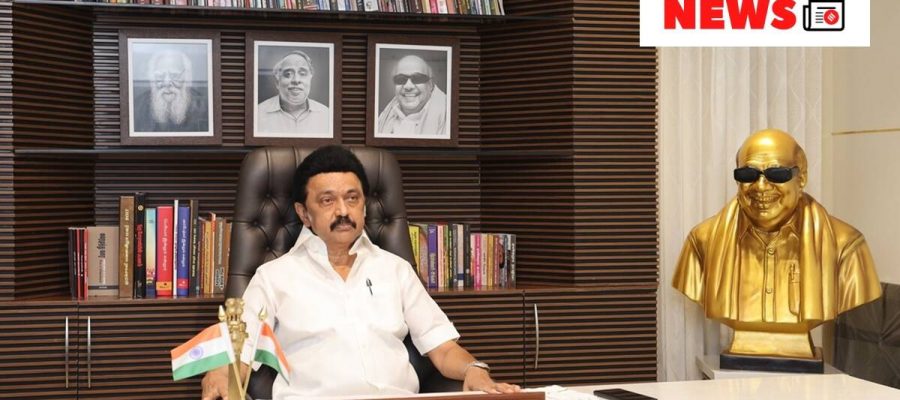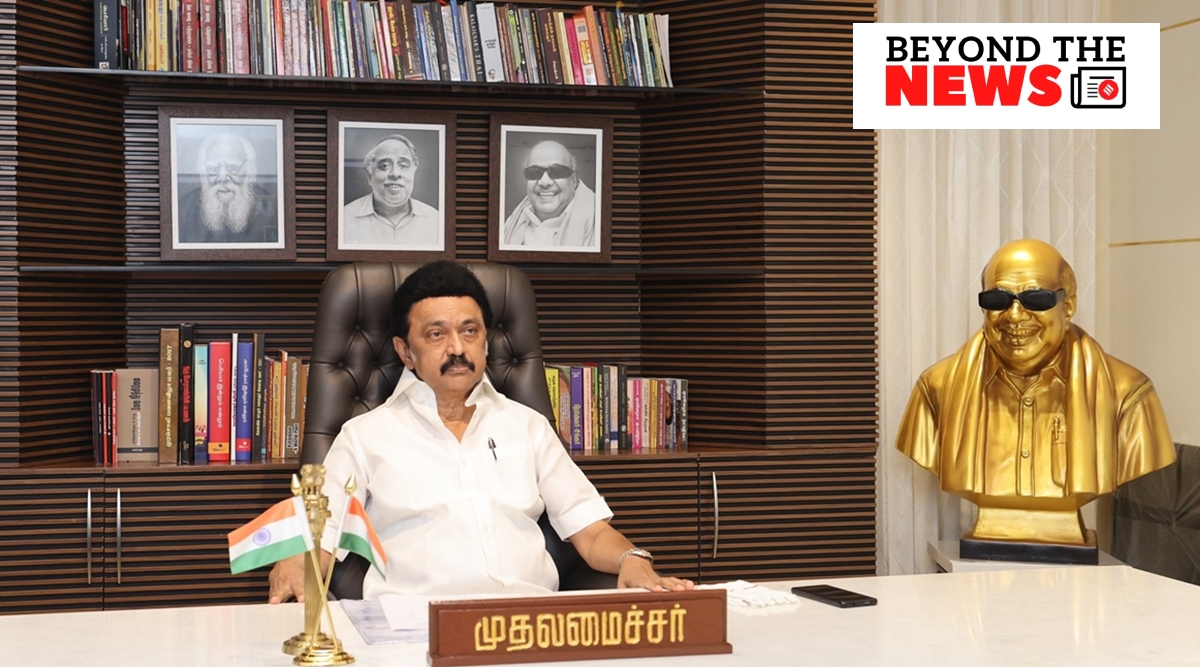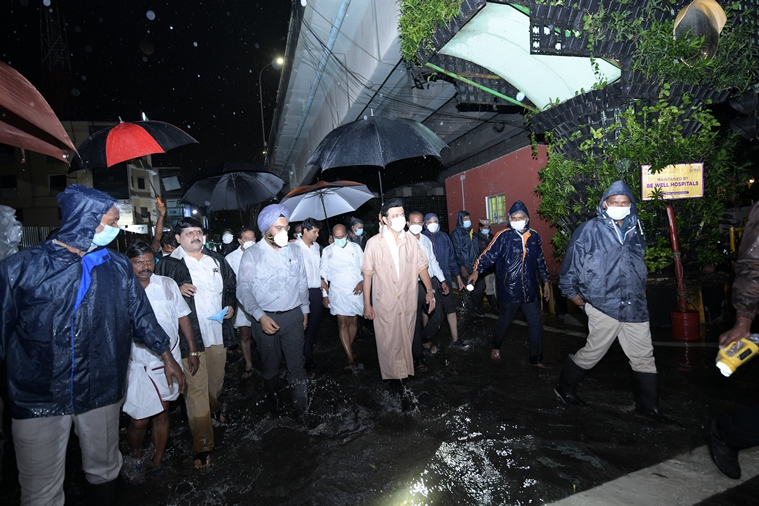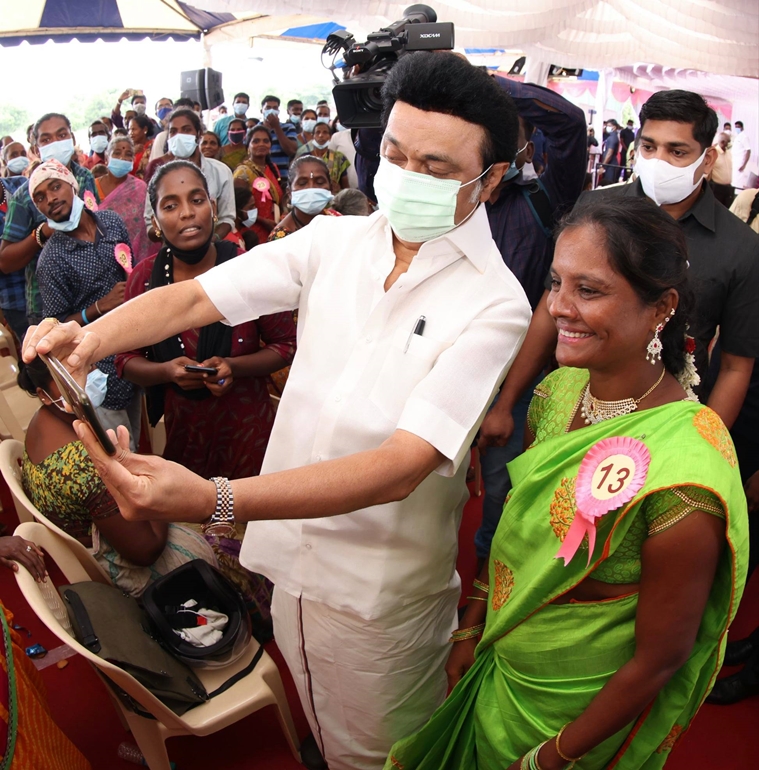Few expected the transformation, particularly given Stalin's much mellower public stints as Chennai mayor from 1996 to 2001 and as deputy CM from 2006-11.
As he finishes six months as Chief Minister, M K Stalin has come a long way out of his father’s shadow. Whether in gumboots and raincoat inspecting flooded Chennai, distributing house pattas to the Irula community in a quick response to the recent trilingual Amazon Prime hit Jai Bhim, pedalling to local shops in bicycle gear for a quick cup of tea, picking professionals to steer the economy, or reaching out across the deep political divide in Tamil Nadu, the 68-year-old is basking in a new light.
Few expected the transformation, particularly given Stalin’s much mellower public stints as Chennai mayor from 1996 to 2001 and as deputy CM from 2006-11. After that, as an ailing M Karunanidhi headed the DMK, the party kept struggling to catch up with the AIADMK, though it was hobbled by Jayalalithaa’s long illness and eventual demise.
Aides say Stalin, who is comparatively old in times of stress on youth in politics, is preparing the ground to stay in power for at least 10 years.
One of the most striking images of Stalin’s chief ministership came pretty early on. In a state used to titans Karunanidhi and Jayalalithaa refusing to even attend the Assembly when the other was the CM, Stalin was captured sitting in the middle of AIADMK ex-CMs O Panneerselvam and Edappadi K Palaniswami, in August. He had gone to offer his condolences over the death of a senior AIADMK leader.
Stalin has also made a conscious effort to distance himself from the memories of the last DMK regime, which was marked by strong-arm behaviour of party leaders (especially Stalin’s elder brother M K Alagiri), and corruption. After the DMK came to power, there were no large-scale transfers, unlike earlier. Sources say clear instructions have gone out to DMK leaders to not meddle in government affairs, especially the appointments of collectors and SPs. “He chose young, non-promotee officers,” a senior bureaucrat says.
At the senior level, Stalin named an Economic Advisory Council comprising experts such as Nobel laureate Esther Duflo, former RBI governor Raghuram Rajan and former Chief Economic Advisor to the Centre Aravind Subramanian. They have had several sittings with the CM. Changes initiated by them include the recent Illam Thedi Kalvi or ‘Education at Doorstep’ scheme, to address the learning gap among students during the pandemic.
Finance Minister P Thiagarajan, a much-appreciated choice due to his educational qualifications, has emerged as an authoritative voice on issues of concern to states – especially amidst the tussle with the Centre over pending GST dues.
Besides, Stalin and his team have their ear to the ground. Soon after a viral video emerged in end October, of a woman from the indigenous Narikurava community talking about discrimination at a temple, Hindu Religious and Charitable Endowments Minister P K Sekar Babu shared a public meal with her and other community members. Within days, Stalin himself visited her. The CM also set the ball rolling on an old debate, which has much resonance in TN, over what to call the government at the Centre – ‘Central’ or ‘Union’, with the DMK stressing on the latter.
The Stalin government was praised for its handling of the second wave of Covid-19, despite having been just elected to power. His announcement of 10.5% reservation for the Vanniyar community, with the full knowledge that it would likely be struck down by courts, was a clever political move.
Among the other DMK government’s schemes that have gone down well are free travel in government buses for all working women as well as transsexuals, Stalin’s visits to backward districts, appointment of non-Brahmin priests, support for trained women priests in temples, a separate budget for agriculture, and a decision to recognise single women separated from their families as ‘family’, so that they could access ration cards.
AIADMK leader and former revenue minister R B Udhayakumar says Stalin has been more intent projecting himself rather than any real work. “They spoke about the immediate release of the seven convicts in the Rajiv Gandhi case, for example. What happened? Why is Stalin still chit chatting with the Governor instead of taking steps to release them? Where is the NEET cancellation that was promised?” Udhayakumar said, adding that the Stalin government “was largely noise and zero action”.
He added that while visiting flooded areas was a good photo-op, “where is the solution for areas that are still water-logged”. “When people are suffering, Stalin is busy issuing tenders for a new Kalaignar Memorial.”
Within the DMK, Stalin is seen as concentrating powers in his own hands. While Alagiri is out of the picture, message has gone out to the other sibling Kanimozhi to confine herself to Delhi and own constituency Thoothukudi. Former Union minister Dayanidhi Maran has been similarly told to concentrate “on Central Chennai”.
While Stalin’s closest aides include DMK veterans E V Velu, K N Nehru, Duraimurugan and former Union ministers T R Baalu and A Raja, actual power rests with him, his rising son Udhayanidhi, and Chepauk MLA Thiruvallikeni, apart from Stalin’s son-in-law Sabareesan.
Udhayanidhi is in the process of wrapping up his film engagements. By the start of next year, said sources, he will be free for full-time political work.
Source: Read Full Article





